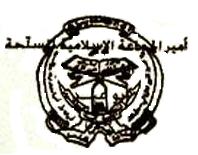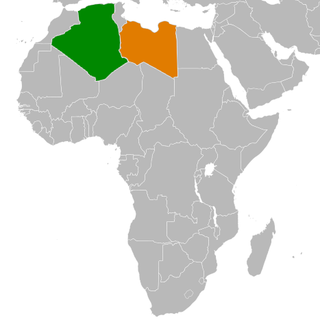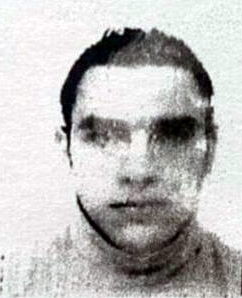Related Research Articles

The Armed Islamic Group was one of the two main Islamist insurgent groups that fought the Algerian government and army in the Algerian Civil War.

Islam is the official state religion in Tunisia. According to the United States CIA, 99.1% of its adherents are Sunni Muslims. The constitution of Tunisia states that the country's “religion is Islam”, the government is the “guardian of religion”, and requires that the president be Muslim. The predominant madhhab in the country is the Maliki school. The Tunisian island of Djerba is home to a population of Ibadi Muslims.

The Algerian Civil War, known in Algeria as the Black Decade, was a civil war fought between the Algerian government and various Islamist rebel groups from 11 January 1992 to 8 February 2002. The war began slowly, as it initially appeared the government had successfully crushed the Islamist movement, but armed groups emerged to declare jihad and by 1994, violence had reached such a level that it appeared the government might not be able to withstand it. By 1996–97, it had become clear that the Islamist resistance had lost its popular support, although fighting continued for several years after.

The Salafist Group for Preaching and Combat, known by the French acronym GSPC, was an Algerian islamist terrorist faction in the Algerian Civil War founded in 1998 by Hassan Hattab, a former regional commander of the Armed Islamic Group (GIA). After Hattab was ousted from the organization in 2003, the group officially pledged support for al-Qaeda, and in January 2007, the group officially changed its name to the "Al-Qaeda Organization in the Islamic Maghreb" (AQIM).

An Islamist insurgency is taking place in the Maghreb region of North Africa, followed on from the end of the Algerian Civil War in 2002. The Algerian militant group Salafist Group for Preaching and Combat (GSPC) allied itself with al-Qaeda to eventually become al-Qaeda in the Islamic Maghreb (AQIM). The Algerian and other Maghreb governments fighting the militants have worked with the United States and the United Kingdom since 2007, when Operation Enduring Freedom – Trans Sahara began.

Algeria and the Tunisia are both predominantly Muslim nations in North Africa. Both countries have historic dynasties primarily focused in Algiers and Tunis that became specialized in piracy and global trade. Eventually these dynasties fell under the influence of the French in the 19th century. Both remained under French control until Tunisian independence became official in 1956 and Algeria became independent after the conclusion of the Algerian War in 1962. Since independence both countries have had periods of antagonism over issues such as border security and terrorism, however it appears that both countries are trending towards a positive relationship. The Algerian-Tunisian border is around 1034 km (642 mi) long and was officially agreed upon in 1960. Both countries are members of the African Union, Arab League, Organisation of Islamic Cooperation, Union for the Mediterranean and the United Nations.

Relations between Algeria and Libya have undergone significant changes over the past decade. The previous tensions between the revolutionary National Transitional Council (NTC) of Libya and the single-party autocracy of Algerian President Abdelaziz Bouteflika are now part of history: Bouteflika resigned in 2019 following widespread protests, and the NTC was succeeded by other governing bodies in Libya.
Events from the year 2009 in Algeria

Al-Qaeda in the Lands of the Islamic Maghreb, or AQIM, was an Islamist militant organization that aims to overthrow the Algerian government and institute an Islamic state. To that end, it was then engaged in an insurgency campaign in the Maghreb and Sahel regions.
The Movement for Oneness and Jihad in West Africa or the Movement for Unity and Jihad in West Africa, was a militant Islamist organisation that broke off from Al-Qaeda in the Islamic Maghreb with the intended goal of spreading jihad across a larger section of West Africa, as well as demanding the expulsion of all French interests that operate in West Africa, which they regard as "colonialist occupiers".

The In Amenas hostage crisis began on 16 January 2013, when al-Qaeda-linked terrorists affiliated with a brigade led by Mokhtar Belmokhtar took expat hostages at the Tigantourine gas facility near In Amenas, Algeria. One of Belmokhtar's senior lieutenants, Abdul al Nigeri, led the attack and was among the terrorists killed. After four days, the Algerian special forces raided the site, in an effort to free the hostages.
A political crisis evolved in Tunisia following the assassination of leftist leader Mohamed Brahmi in late July 2013, during which the country's mainly secular opposition organized several protests against the ruling Troika alliance that was dominated by Rashid al-Ghannushi's Islamist Ennahda Movement. The events came as part of the aftermath of the Tunisian Revolution which ousted the country's longtime president Zine El Abidine Ben Ali, followed by a general election which saw Ennahda win a plurality alongside Moncef Marzouki's allied Congress for the Republic (CPR). The crisis gradually subsided when Prime Minister Ali Laarayedh resigned and a new constitution was adopted in January 2014.

The Libyan civil war (2014–2020), also known as the Second Libyan Civil War, was a multilateral civil war which was fought in Libya among a number of armed groups, but mainly the House of Representatives (HoR) and the Government of National Accord (GNA), for six years from 2014 to 2020.

The Chaambi Operations, or Battle of Chaambi were part of the insurgency in the Maghreb. In December 2012, the Tunisian Army launched an offensive against the Salafist jihadists in Jebel ech Chambi near Kasserine. The conflict ended with the victory of the Tunisian Army in 2019.

On 18 March 2015, two militants attacked the Bardo National Museum in the Tunisian capital city of Tunis, and took hostages. Twenty-one people, mostly European tourists, were killed at the scene, and an additional victim died ten days later. Around fifty others were injured. The two gunmen, Tunisian citizens Yassine Labidi and Saber Khachnaoui, were killed by police. Police treated the event as a terrorist attack.

On 20 November 2015, Islamist militants took 170 hostages and killed 20 of them in a mass shooting at the Radisson Blu hotel in Bamako, the capital city of Mali. The siege was ended when Malian special forces, backed by U.S. and French personnel, launched an assault on the hotel to recover the surviving hostages. Al-Mourabitoun claimed that it carried out the attack "in cooperation with" al-Qaeda in the Islamic Maghreb; an al Qaeda member confirmed that the two groups cooperated in the attack.

The Islamic State Insurgency in Tunisia referred to the low–level militant and terror activity of the Islamic State branch in Tunisia from 2015 to 2022. The activity of the Islamic State (IS) in Tunisia began in June 2015, with the Sousse attacks, though an earlier terror incident in Bardo Museum in March 2015 was claimed by ISIL, while the Tunisian government blamed Okba Ibn Nafaa Brigade for the attack. Following massive border clashes near Ben Guerdane in March 2016, the activity of the IS group was described as an armed insurgency, switching from previous tactics of sporadic suicide attacks to attempts to gain territorial control. The armed insurgency was suppressed in 2022.

Mohamed Salmene Lahouaiej-Bouhlel was a Tunisian terrorist who carried out the 2016 Nice truck attack, in which he drove a truck into a crowd celebrating Bastille Day on the Promenade des Anglais in Nice, France, hitting 520 people, killing 86 and injuring another 434. Immediately after the attack, Lahouaiej-Bouhlel was shot dead by responding French police officers.
From March to May 1998, a terror plot against the 1998 FIFA World Cup in France was uncovered by European law enforcement agencies. More than 100 people were arrested in seven countries as a result of the plot, although only some of them were tried or convicted. Organised by the Algerian Armed Islamic Group (GIA) and backed by Al-Qaeda leader Osama bin Laden, the plot is thought to have targeted the England–Tunisia match on 15 June 1998, and involved infiltrating the Stade Vélodrome in Marseille in order to attack players and spectators during the game, attack the hotel in Paris hosting the United States national team, and finally hijacking an aircraft and crashing it into the Civaux Nuclear Power Plant near Poitiers.
References
- ↑ (in French) L’attaque terroriste de "Sondes"…22 ans après, Mosaique FM, 12 February 2017.
- 1 2 Maddy-weitzman, Bruce (1997-10-30). Middle East Contemporary Survey: Volume Xix, 1995. The Moshe Dayan Center. p. 630. ISBN 978-0-8133-3411-0.
- ↑ Ibrahim, Youssef M. (1995-02-17). "Algeria Rebels Said to Attack Post in Tunisia". The New York Times. ISSN 0362-4331 . Retrieved 2023-03-08.